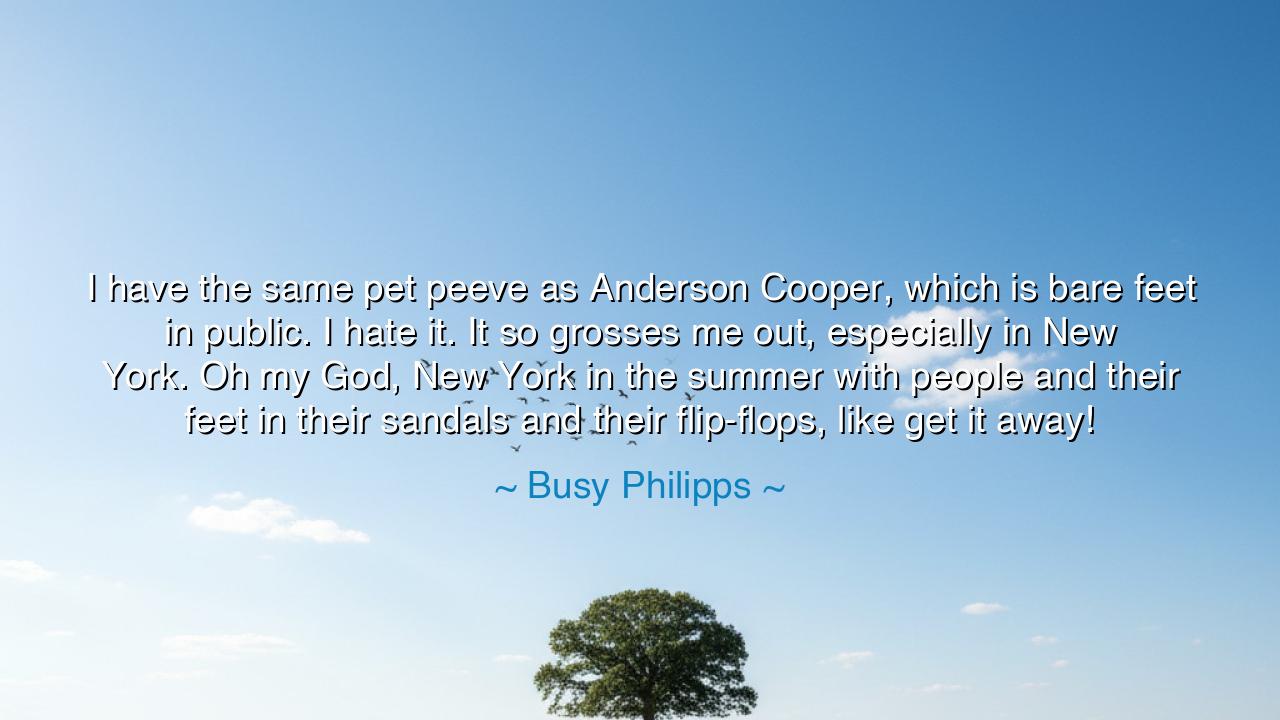
I have the same pet peeve as Anderson Cooper, which is bare feet
I have the same pet peeve as Anderson Cooper, which is bare feet in public. I hate it. It so grosses me out, especially in New York. Oh my God, New York in the summer with people and their feet in their sandals and their flip-flops, like get it away!






Hear now the impassioned cry of Busy Philipps, who declared: “I have the same pet peeve as Anderson Cooper, which is bare feet in public. I hate it. It so grosses me out, especially in New York. Oh my God, New York in the summer with people and their feet in their sandals and their flip-flops, like get it away!” Though clothed in humor and exaggeration, these words speak to something older than fashion or footwear. They strike at the tension between public order and private expression, between the ideals of cleanliness and the realities of human freedom.
For what are bare feet in the streets of a city, if not a symbol of vulnerability, of exposure, of informality brought into the realm of the public? In the fields, in the village, even in the sacred temple, the act of removing sandals was once a gesture of humility or reverence. But in the city, especially the great stone desert of New York, the sight of exposed feet may seem to many as a defilement, an intrusion of flesh into a place meant for boots, leather, and armor against the grime of the streets. Thus, the discomfort Philipps describes is not only personal—it is cultural, born from the clash of expectations about how one ought to present oneself among the multitudes.
The ancients themselves wrestled with such tensions. In Rome, the senator wore his shoes as a mark of dignity, while the soldier marched in sandals crafted for war. To walk barefoot in the Forum was a sign of shame or of poverty. In Sparta, by contrast, young men were trained to walk without sandals, hardened against pain, their bare feet a badge of endurance. What one culture despised, another exalted. And so it is today: what disgusts one heart, another proclaims as freedom.
Consider too the story of Moses, who before the burning bush was commanded to remove his sandals, for the ground he stood upon was holy. There the act of baring the foot became not shame, but reverence. Yet in New York in the summer, as Philipps observes, the act is not reverence but carelessness, the mingling of sacred flesh with polluted streets. Thus, context makes all the difference: the same gesture that sanctifies in one place may offend in another.
Philipps’s vivid words remind us also of the power of the city itself. In a place of crowds, every act is magnified, every gesture is judged. To display one’s feet in the marketplace of New York is not the same as walking barefoot upon the grass. The setting makes the act, and in the sweltering summer, when the streets reek of heat and refuse, the bare foot becomes a symbol not of freedom but of intrusion. Her disgust reflects not mere fastidiousness, but a visceral defense of order in the chaos of urban life.
The lesson here is not simply about footwear, but about respect and perception. In public spaces, we are bound together by an invisible covenant: to honor the sensibilities of those who share the space with us. To ignore this covenant is to invite discomfort, judgment, even disgust. The ancients would have called this aidos—the virtue of respect, of knowing what is fitting in each time and place. To fail in it is to dishonor the community.
Practically, this means: in the city, clothe yourself with awareness. Understand that what you do in solitude may not be fit for the crowded streets. Guard your steps, guard your presence, for in doing so you honor those around you. And if you are one who, like Philipps, feels revulsion at the sight of what others deem acceptable, temper your judgment with understanding: cultures shift, customs differ, and what repels one heart may seem natural to another.
Therefore, O children of tomorrow, take heed. The question is not whether sandals or flip-flops are right or wrong, but whether we carry ourselves in public with mindfulness, dignity, and care. Busy Philipps’s words, though humorous, remind us that in every shared space, the small details of our behavior matter. Let us walk, then, not only with covered or uncovered feet, but with respect—for the city, for our neighbors, and for the unseen covenant that binds us together.






AAdministratorAdministrator
Welcome, honored guests. Please leave a comment, we will respond soon